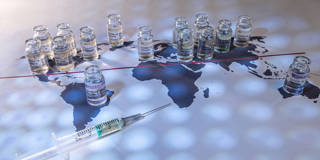Trust is a precious commodity. By failing to do more to help the rest of the world get vaccinated as quickly as possible, Western advanced economies are squandering their most important resource and jeopardizing the international system upon which their prosperity is based.
CAMBRIDGE – The proper functioning of any interconnected economic system depends on trust. It is also the case that a global system that has been designed by advanced economies requires a significant level of buy-in from the developing world. Both become even more important as more developing economies, led by China, gain systemic importance.
With the world trying to recover from the massive economic shock brought by COVID-19, the mishandling of the global vaccine rollout has weakened trust in the international system that emerged after World War II. Combined with memories of the 2008 global financial crisis, which originated in the advanced economies, today’s failures are reinforcing suspicions among some countries that the international order may no longer be fit for purpose. The West, in particular, must take these concerns seriously. With no other multilateral system to replace the current one, the only alternative is a scenario of global fragmentation and rising economic, social, and political tensions.
Although the United Kingdom has been ahead of most other countries in vaccinating its population, its struggle to hold down infections associated with the new B.1.617.2 variant from India serves as a timely reminder that no one is safe until everyone is. As the thoughtful former British Prime Minister Gordon Brown notes, whereas “nearly half of US and UK citizens have now received at least one” dose of a COVID-19 vaccine, that figure drops to 11% India. In Sub-Saharan Africa, barely 1% of the population has received a single dose.

CAMBRIDGE – The proper functioning of any interconnected economic system depends on trust. It is also the case that a global system that has been designed by advanced economies requires a significant level of buy-in from the developing world. Both become even more important as more developing economies, led by China, gain systemic importance.
With the world trying to recover from the massive economic shock brought by COVID-19, the mishandling of the global vaccine rollout has weakened trust in the international system that emerged after World War II. Combined with memories of the 2008 global financial crisis, which originated in the advanced economies, today’s failures are reinforcing suspicions among some countries that the international order may no longer be fit for purpose. The West, in particular, must take these concerns seriously. With no other multilateral system to replace the current one, the only alternative is a scenario of global fragmentation and rising economic, social, and political tensions.
Although the United Kingdom has been ahead of most other countries in vaccinating its population, its struggle to hold down infections associated with the new B.1.617.2 variant from India serves as a timely reminder that no one is safe until everyone is. As the thoughtful former British Prime Minister Gordon Brown notes, whereas “nearly half of US and UK citizens have now received at least one” dose of a COVID-19 vaccine, that figure drops to 11% India. In Sub-Saharan Africa, barely 1% of the population has received a single dose.